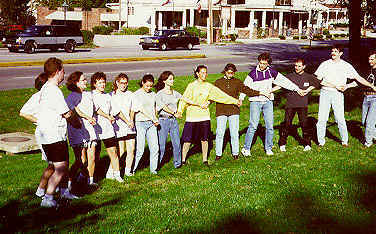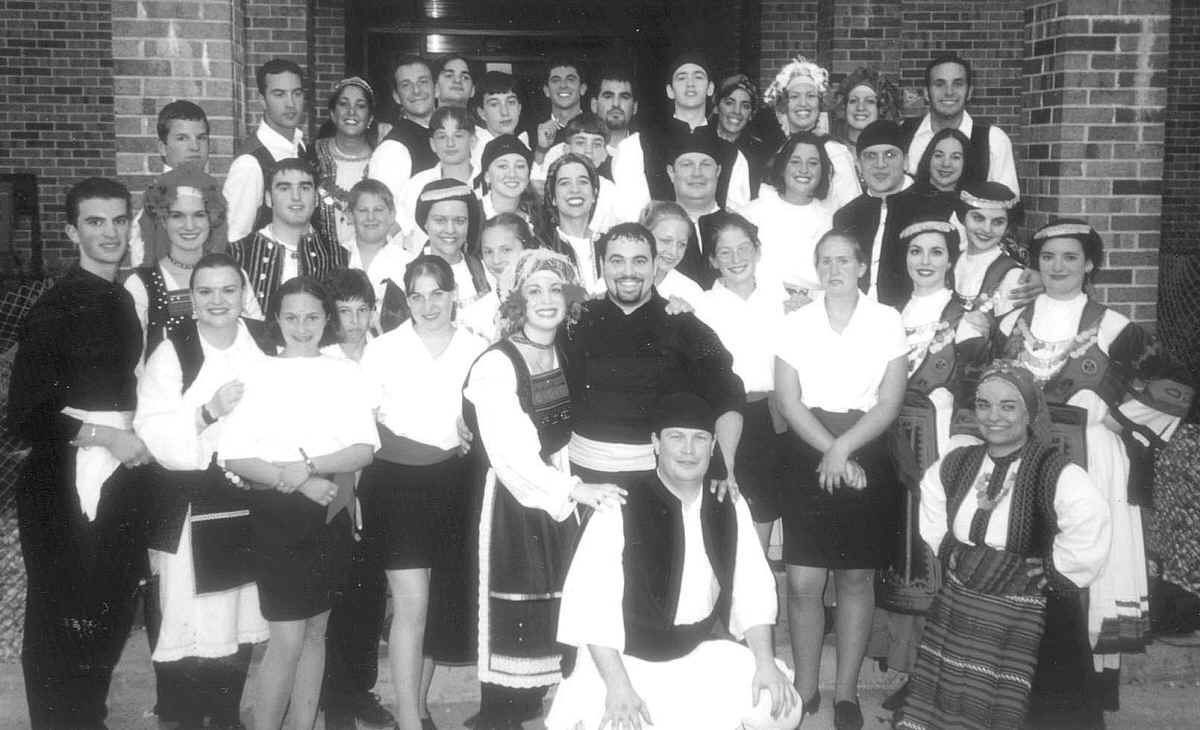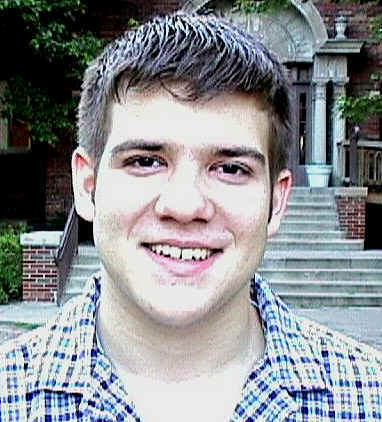 Orpheus Youth Group Debuts at Skokie
Festival of Cultures! Orpheus Youth Group Debuts at Skokie
Festival of Cultures! |
 Orpheus Youth Group
Branch in Glenview! Orpheus Youth Group
Branch in Glenview! |
 Teaching Folk Dance Teaching Folk Dance |
 Metsovo Society Dinner Dance Metsovo Society Dinner Dance |
 Lyra Has A New Look Lyra Has A New Look |
 Orpheus Debuts in Michigan Orpheus Debuts in Michigan |
 OHFS Anecdotes OHFS Anecdotes |
 Spotlight on Orpheus Dancer Spotlight on Orpheus Dancer |
 Personals Personals |
|
 |
| Orpheus
Youth Group Debuts at Skokie Festival of Cultures! |
|

|
 |
 |
|
|
|
| The Orpheus Hellenic Society is moving forward into the future with the
growing presence of its Orpheus Youth Group! The first group of young Greek dancers
made their debut at the Skokie Festival of Cultures on a warm and sunny Saturday, May 22,
and demonstrated remarkable poise and youthful spirit in their first public dance
performance! |
|
|
There was much excitement in the dressing rooms as the youth dancers donned their costumes
and were assisted by veteran members of the OHFS. "I'm so nervous, but excited,
too!" confessed Genevieve Theodorakis with a smile as she tucked her hair into the
hat of her Gida costume. Across the hall from the girls, the guys were
proudly showing off their new Epirotan costumes (handmade by Mrs. Dina Sianis) while they
practices Tsamiko kicks and other figoures (variations). |
|
|
As Orpheus youth instructors Christina Pagones and Alexander Kapotas cheered them on from
the sidelines, the young dancers performed a series of dances from mainland Greece,
including Tsourapia and Bella Olympio from Macedonia. The young men
also performed the popular Tsamikos while the girls took their turn with Dimitroula,
a Macedonian dance usually performed by women. |
|
|
The youth group joined the Orpheus Dance Troupe for the last dance, Zonarathikos, and it
was heartwarming to see the mix of youth and adult dancers carrying on the folk traditions
of their Hellenic heritage. "The formation of the Orpheus Youth Group is vital
to the perpetuation and preservation of our folk culture and traditions," commented
Yannis Economou, OHFS director. "We must expose our young people to elements of
our Greek culture to strengthen our community and take it into the future
generation." Added youth instructor Christina Pagones, "the youth group
has shown such enthusiasm from the very first dance lesson, and I'm so proud to see them
performing today! They did a great job, and we're looking forward to the summer
session and the addition of many new students next year!" |
|
 Top of
Page Top of
Page |
|
|
 |
| Orpheus Youth Group Branch in Glenview! |
|
 The Orpheus Hellenic Folklore Society is pleased to announce the expansion of its Youth
Group program with the establishment of a second branch in Glenview, Illinois. The
new branch will be launched during the upcoming fall season and classes will be held every
Saturday, 1:15 pm - 2:15 pm, at the multipurpose room of the New Church, 74 Park Drive in
Glenview. The new and spacious facility is located one block west of the
intersection of Glenview and Shermer Roads. Classes will start on Saturday,
September 18, 1999 and will conclude on May 27, 2000. A total of 32 dance sessions
have been tentatively scheduled during this period.
The Orpheus Hellenic Folklore Society is pleased to announce the expansion of its Youth
Group program with the establishment of a second branch in Glenview, Illinois. The
new branch will be launched during the upcoming fall season and classes will be held every
Saturday, 1:15 pm - 2:15 pm, at the multipurpose room of the New Church, 74 Park Drive in
Glenview. The new and spacious facility is located one block west of the
intersection of Glenview and Shermer Roads. Classes will start on Saturday,
September 18, 1999 and will conclude on May 27, 2000. A total of 32 dance sessions
have been tentatively scheduled during this period. |
|
|
The North Shore branch was established in response to an increased demand by residents of
the surrounding areas who were unable to commute to the city. This will provide the
opportunity for many more young Greek Americans to become part of the OHFS family and
enjoy the high quality instruction of Greek folk dances, history and tradition in a
friendly ad organized environment. The Chicago branch will continue its operation at
its current location at River Park, where classes are held every Thursday from 6:15 pm -
7:15 pm. The OHFS is very excited about this new opportunity to reach an even larger
part of the community. Come join us! For registration information, schedules
and fees, please call (847) 251-0856 or contact us at www.ohfs.org. |
|
 Top of
Page Top of
Page |
|
 |
| Teaching
Folk Dance |
|
 Let us first admit from the start that many people
do not consider "folk dance" as a serious or even worthwhile endeavor.
There are elements in modern society that consider folk dance "primitive,"
having been created by and for the "peasants," and not worthy of the allocation
of scarce resources. Some of the reasons are that folk dance did not originate in
the theater and its purpose was not to entertain an audience but rather to serve a set of
functions within a rural society of the past. Many modern urbanites seem to believe
that the fact it served a rural society exempts folk dances from being able to serve them
in any meaningful manner. In addition, the quality of a majority of folk dance
performances compared to other theatrical dance presentations is considered by many today
as substandard. Let us first admit from the start that many people
do not consider "folk dance" as a serious or even worthwhile endeavor.
There are elements in modern society that consider folk dance "primitive,"
having been created by and for the "peasants," and not worthy of the allocation
of scarce resources. Some of the reasons are that folk dance did not originate in
the theater and its purpose was not to entertain an audience but rather to serve a set of
functions within a rural society of the past. Many modern urbanites seem to believe
that the fact it served a rural society exempts folk dances from being able to serve them
in any meaningful manner. In addition, the quality of a majority of folk dance
performances compared to other theatrical dance presentations is considered by many today
as substandard. |
|
|
The practice of dancing the folk dances of a past culture must also serve some purpose for
those in the present if they are to perpetuate these dances. The three main
functions of folk dance in the village are social interaction as part of the structured
life of the villager, enjoyment leading to dance ecstasy, and catharsis. |
|
|
To enable the preservation of Greek folk dance and culture, it must serve a function for
the modern-day participants of the dance as well. Folk dance serves a similar
function in urban society as it has done, and sometimes still does, in the village for
both Greek urbanites as well as Greek immigrants in their dinner dances and festivals as
social interaction and as a means of bringing their Greek youth together in a Hellenic
setting to meet each other. Young people's opportunities in the village before the
turn of the century to meet other youth and make choices about potential mates were
concentrated at the village festival. But living in an urban environment or the
Diaspora, Greek youth have other opportunities to meet young people within ad
without their own ethnicity. |
|
|
The physical enjoyment of moving to beautiful music is still served, but the functions of
dance ecstasy and catharsis seem to be weakly served and could be enhanced if people
learned to express themselves freely in the dance. Those who have learned the dance
in their own village setting over a prolonged period of time naturally absorbed the step,
style and context of the dance. The rest of us are at a severe disadvantage. |
|
|
The two main components necessary to teaching folk dance, in general, are steps and
style. A third component important to understanding folk dance is the context:
who created the dance, on what occasion is the dance done, what customs and traditions
surround the occasion of the dance? In addition, dance groups come face-to-face with
one of the most irascible questions in folk dance that tends to cloud and strain the
impetus to teach context, the question of authenticity versus entertainment value.
Most dance groups aspire both to entertain and preserve culture with their
performances. How much "artistic license" should be used to change the
dances to overcome the monotony that an uninitiated audience experiences when it observes
folk dance; dances that in the village context are danced for hours and have the purpose
of creating hypnotic, cathartic and socializing functions for villagers that the audience
cannot possibly experience if they are not part of the "event"? |
|
|
I believe Professor Alkis Raftis (1992) has expressed his yearning for a higher quality of
(folk dance) performance vehicle in this way: |
|
"This question around authenticity is
important because it demonstrates, at least in words, a sensitivity of the dance groups
for the preservation of dance in its original form."
|
Editor's Note: This
article was condensed from the original first published in I didaskalia to horou
(Teaching Dance), Proceedings of the 7th International Conference on Dance Research,
Portaria, July 7-11, 1993, International Organization of Folk Arts, Athens, 1993
|
|
 Top of
Page Top of
Page |
|
 |
| Metsovo Society Dinner
Dance |
|
|
| The Orpheus Dance
Troupe has performed at many dinner dances hosted by local Greek american organizations
whose members originate from a particular region or village of Greece. When Mr. Dino
Vadevoullis, President of the Metsovion Cultural Association, invited the Troupe to
perform at the organization's first annual dinner dance, he made an interesting
proposition: the dance presentation would include not only dances from the village
of Metsovo but, through his contacts, authentic costumes from Metsovo would be transported
from Greece for the Troupe members to wear during their performance. |
|
| From that moment the
Orpheus Dance Troupe went on a Metsovo red alert! The Troupe began to pull together
music and tapes of Metsovo dances from the OHFS collection. Just last October,
during the North American Dance Conference in Montreal, Quebec, the Troupe had learned a
suite of dances from Metsovo, taught by Dimitri Tzortzis. In addition, during the
events commemorating Greek Independence Day in Chicago, the dance group of the cultural
association "Krystalli" of Epirus, Greece, performed an expanded repertoire of
dances from that region. During their stay, members of the group generously
demonstrated the appropriate style and presentation of the dances of Metsovo and the
entire Epirotan region in general to OHFS. |
|
| Jim Stoynoff,
Chicago's renowned clarinet player who has accompanied the Orpheus Dance Troupe in several
appearances, loaned OHFS a high quality audio tape with dances from Metsovo from his
personal collection, as well as a videotape filmed in Metsovo, which included locals
performing their dances. This material was an invaluable resource in understanding
the authentic style and steps of their dances from Metsovo. |
|
| Just a couple of days
before the performance, the costumes arrived in Chicago. Their beauty, workmanship
and colors were astonishing! In order to accommodate additional Troupe members,
costumes from the OHFS collection were also utilized. Many thanks are extended also
to Dr. Michael Kontos, Eva Kontos and Nick and Elena Vranas of the Apollo Dance Troupe who
loaned the OHFS costumes from their collection to complement the male costumes from
Metsovo. They all went out of their way to accommodate this request. |
|
| The debut of the new
dances took place the same day during an early afternoon performance at the Skokie
Festival of Cultures. Trying to coordinate three performances in one day, which
included the Youth Group's first performance, proved to be challenging. That day,
over 60 costumes were used for all three appearances! |
|
| That night, despite
being rushed onto the stage almost an hour earlier due to a scheduling change in the
program, the OHFS performance at the impressive International Ballroom of the Chicago
Hilton and Towers was enthusiastically received. The only disappointment was letting
the beautiful Metsovo costumes go as they were returned to Greece the next day. They
will be missed! |
|
| The OHFS would like to
thank Mr. Dino Vadevoulis and the Metsovion Cultural Association for their gracious
invitation and the trust they bestowed on local talent to be part of their affair. |
|
 Top of Page Top of Page |
|
 |
| Lyra Has A New Look |
|
| By now, you have all
noticed Lyra's new look! This is the second issue to be published using a new
layout. OHFS member and graphic designer Christina Kakavas was assigned the task of
re-designing the newsletter to give it an updated look. |
|
| "I was striving for a
layout which would reflect the creativity of our dance group," Christina commented;
she also intends for the Lyra to express the youthful and innovative direction of the
OHFS. |
|
| A varied selection of
layouts was presented to the newsletter committee before this particular format was
finally chosen. In addition to the new Lyra logo on the front page, other changes in
the new format include the use of more photographs and graphics, a new section for
anecdotal stories written by members of the troupe, an expanded personals section and a
new layout for the spotlight dancer segment. Also, the newsletter itself has been
expanded, with extra pages added to accommodate these changes and allow for more
information in each issue! |
|
| Through Chrstina's
efforts and the work of the entire newsletter editorial staff (always busily working
behind the scenes), the Lyra will continue to provide updated news from the Orpheus Dance
Troupe and its members, as well as educational information on Greek folk dance and the
rich traditions of our Hellenic culture. We hope you enjoy our new look! |
|
 Top of Page Top of Page |
|
 |
| Orpheus Debuts in
Michigan |
|
 The OHFS paid its first
visit to the state of Michigan by performing at the St. Demitrios Church Festival in
Saginaw. The three day trip included five performances which consisted of dance
suites from the Greek mainland and islands, incorporating two sets of costumes. The OHFS paid its first
visit to the state of Michigan by performing at the St. Demitrios Church Festival in
Saginaw. The three day trip included five performances which consisted of dance
suites from the Greek mainland and islands, incorporating two sets of costumes. |
|
| The St. Demitrios
Church was founded in 1937 and is currently located on a spacious 22 acre piece of land
that is ideal for hosting an outdoor festival. The festival's program offered a
steady stream of entertainment provided by the five participating dance troupes. In
addition to the OHFS, three local church groups and the Glendi Dancers from Detroit
performed. This was not the first time the Orpheus Dance Troupe has performed with
the Detroit group. The Glendi Dancers have previously visited Chicago during past
Diocese dance conferences as well as various local affairs. |
|
| The main area of the
festival grounds had a raised stage for the dance presentations and amphitheater style
seating was arranged in front of the stage. The crowds attending the festival were
huge. According to organizers, the St. Demitrios festival is the largest Greek
church festival in the state! Excellent organization and planning, ample space,
homemade quality food, and a warm spirit have definitely contributed to the festival's
popularity! |
|
| The OHFS would like to
thank the festival committee and the community of St. Demitrios for their warm reception
and hospitality. Many thanks also to Mrs. Soula Economou who made all the necessary
arrangements for the Troupe's participation, and our gratitude is extended particularly to
the members of the local dance groups for attending to our needs and providing us with
fond memories! Hopefully, we will se you again next year! |
|
 Top of Page Top of Page |
|
 |
| OHFS Anecdotes |
|
| It was the summer of
1991. The Orpheus Dance Troupe was preparing for a series of performances during the
annual Pan-Macedonian Convention. For the first time in its short history, the
Troupe's performance would be accompanied by live music from artists who were coming
directly from Greece. |
|
| George Melikis, a
renowned ethnographer and Greek folk music researcher, was leading an extremely talented
group of musicians, each of whom was skilled in playing a variety of musical
instruments. It was an amazing sight to see the musicians play first as a Macedonian
ensemble utilizing the gaeda (bagpipe), daouli (drum) and zourna
(wind instrument), then transform into a Greek island musical group by switching to the
violin, lute and toubeleki (small drum) , and then go back to mainland
Greece by playing Epirotan tunes with the clarinet, lute, violin and defi
(tambourine)! |
|
| The setting was Daley
plaza in downtown Chicago where the Orpheus Dance Troupe was performing an hour long
program as part of the "Under the Picasso" series sponsored by the Chicago
Department of Cultural Affairs. During the dance of Zonaradikos, as the
Troupe was circling around the raised stage, two female members somehow disappeared,
falling off of the stage! The rest of the dancers quickly closed the circle while
their two fallen dancers were left at the bottom of the stage, stunned and luckily
unhurt. Despite the original shock, as the circle came around the stage again, the
two unfortunate dancers discreetly joined the line and completed the dance! |
|
| Needles to stay,
everyone was particularly careful with their footing for the remainder of the
program. It was an experience that, after the initial shock was shaken off, was part
of many subsequent jokes and laughs. |
|
 Top of Page Top of Page |
|
 |
| Spotlight on Orpheus Dancer... |
|

Antonis Vasilios
Giannopoulos |
|
|
| Hometown: |
| Elmwood Park, Illinois |
|
| Parents/Family From: |
| Father: Kardama,
a villaage near Pyro |
| Mother: Vahlia, a
little town in the mountains near Tripoli |
|
| Occupation: |
| Student at Fenwick High
School |
|
| Years Dancing with
OHFS: |
| 1-1/2 yrs |
|
| Thoughts on Dancing: |
| It's lots of fun.
Through dancing I am able to express myself in a way very out of the ordinary. Plus,
it's a great workout! |
|
| Favorite Dance: |
| There are so many
dances and they are very diverse in style and step, so it is hard for me to pick just one
dance. But, if I had to choose, it would have to be Pidihtos or Ikariotikos. |
|
| Most Vivid OHFS
Memory: |
| I have two... (1) At
the Museum of Science and Industry performance in 1998 I slipped doing the guys' figoures
(variations) during Pentozalis. I would have fallen flat on my back if it
were not for me holding on to that Greek Man of Mystery, Yanni and (2) I really enjoyed
the Metsovo Society dinner dance performance. It was great wearing the costumes that
were brought from Greece specifically for us to wear. |
|
| Favorite Place in
Greece: |
| I've only been to
Greece once, but out of al the places I visited, Nafplio was the coolest. |
|
| Where I heard about
OHFS: |
| I was recruited by a
friend. |
|
 Top of
Page Top of
Page |
|
|
 |
| Personals |
| Evangelia and Elias Pagones have a new baby
sister! 8 lbs. 2 oz. Kyriaki Ioanna was born on May 23rd to Andy and Mary
Pagones. Congratulations! Na sas zisi! |
|
| Orpheus member Joan Kakos will wed Nick
Christofer on Sunday, July 11th. Joan, a member of Orpheus for many years, will be
moving to California where Nick is finishing law school. Best wishes to them both! |
|
| Alexander Kapotas will be joining the
Orthodox Christian Mission Center's team to Guatemala City this summer. The team
will be doing outreach to the 150+ orphans at the Orthodox Christian orphanage, as well as
structure repairs. |
|
| Dr. Angie Beltsos proudly announces a
scholarship endowment which has been initiated in her parents' name. The Nicholas J.
and Katherine Beltsos Scholarship will be awarded to any Eastern Michigan University
student of Hellenic heritage and is renewable every year. If any student is
interested in attending EMU, please inquire about this exciting opportunity with the
school. |
|
| Antonis Giannopoulos
was selected to attend a 3-week liberal arts study program this summer at the University
of Rethymno, Crete. This program, which is open to all high school students of
Hellenic descent worldwide, is sponsored by the Greek government, which selects the
students on the basis of scholarship and character. Good luck Antonis -- make us
proud! |
|
 New jobs: Congratulations to Harilaos
Georgakopoulos on his new position with Motorola. Kiki Kakavas will be joining
Cook County Hospital, and Christina Rigas will be working at Thresholds, a
psychiatric rehabilitation center. Best of luck! New jobs: Congratulations to Harilaos
Georgakopoulos on his new position with Motorola. Kiki Kakavas will be joining
Cook County Hospital, and Christina Rigas will be working at Thresholds, a
psychiatric rehabilitation center. Best of luck! |
|
| Namesday greetings: Patty Panagakis, Peter
Panagakis, Patty Pappas, Marianna Gudmundsson, Marianna Kaltsa, Sherry Dagrizikos, and Maria
Seretis on August 15th; Alexander Kapotas on August 30th; Voula Drougas
on September 14th; Sophia Sianis and Sophia Tsipianitis on September 17th. |
|
 Birthday wishes: Jim Thanopoulos
on July 3rd, Kathy Tomaras on July 14th; Christina Kakavas on August 15th; Melpo
Katsaros on August 21st, Peter Panagakis on September 2nd and Alexander
Kapotas on September 29th. Birthday wishes: Jim Thanopoulos
on July 3rd, Kathy Tomaras on July 14th; Christina Kakavas on August 15th; Melpo
Katsaros on August 21st, Peter Panagakis on September 2nd and Alexander
Kapotas on September 29th. |
|
| New members who have joined the ranks of OHFS
this year: Ioanna Antonopoulos, Athanasios Arvanitis, Emmanuel Bistas, Eftychia
Gouvas, Marianna Kaltsa, Stavroula Kardasis, Frank Kopanis, Athanasia Kyriakakos, Eleni
Makris, Demetra Moustakis, Larissa Rolley, Betina Roussos, and Noreen Yonkoff.
New Youth Group members include: Colleen Kelly, Emma Keenan, Eleni Press, and
Sarah Press. Welcome to our family and good luck! |
|


 The Orpheus Hellenic Folklore Society is pleased to announce the expansion of its Youth
Group program with the establishment of a second branch in Glenview, Illinois. The
new branch will be launched during the upcoming fall season and classes will be held every
Saturday, 1:15 pm - 2:15 pm, at the multipurpose room of the New Church, 74 Park Drive in
Glenview. The new and spacious facility is located one block west of the
intersection of Glenview and Shermer Roads. Classes will start on Saturday,
September 18, 1999 and will conclude on May 27, 2000. A total of 32 dance sessions
have been tentatively scheduled during this period.
The Orpheus Hellenic Folklore Society is pleased to announce the expansion of its Youth
Group program with the establishment of a second branch in Glenview, Illinois. The
new branch will be launched during the upcoming fall season and classes will be held every
Saturday, 1:15 pm - 2:15 pm, at the multipurpose room of the New Church, 74 Park Drive in
Glenview. The new and spacious facility is located one block west of the
intersection of Glenview and Shermer Roads. Classes will start on Saturday,
September 18, 1999 and will conclude on May 27, 2000. A total of 32 dance sessions
have been tentatively scheduled during this period. Let us first admit from the start that many people
do not consider "folk dance" as a serious or even worthwhile endeavor.
There are elements in modern society that consider folk dance "primitive,"
having been created by and for the "peasants," and not worthy of the allocation
of scarce resources. Some of the reasons are that folk dance did not originate in
the theater and its purpose was not to entertain an audience but rather to serve a set of
functions within a rural society of the past. Many modern urbanites seem to believe
that the fact it served a rural society exempts folk dances from being able to serve them
in any meaningful manner. In addition, the quality of a majority of folk dance
performances compared to other theatrical dance presentations is considered by many today
as substandard.
Let us first admit from the start that many people
do not consider "folk dance" as a serious or even worthwhile endeavor.
There are elements in modern society that consider folk dance "primitive,"
having been created by and for the "peasants," and not worthy of the allocation
of scarce resources. Some of the reasons are that folk dance did not originate in
the theater and its purpose was not to entertain an audience but rather to serve a set of
functions within a rural society of the past. Many modern urbanites seem to believe
that the fact it served a rural society exempts folk dances from being able to serve them
in any meaningful manner. In addition, the quality of a majority of folk dance
performances compared to other theatrical dance presentations is considered by many today
as substandard.
 The OHFS paid its first
visit to the state of Michigan by performing at the St. Demitrios Church Festival in
Saginaw. The three day trip included five performances which consisted of dance
suites from the Greek mainland and islands, incorporating two sets of costumes.
The OHFS paid its first
visit to the state of Michigan by performing at the St. Demitrios Church Festival in
Saginaw. The three day trip included five performances which consisted of dance
suites from the Greek mainland and islands, incorporating two sets of costumes.
 New jobs: Congratulations to Harilaos
Georgakopoulos on his new position with Motorola. Kiki Kakavas will be joining
Cook County Hospital, and Christina Rigas will be working at Thresholds, a
psychiatric rehabilitation center. Best of luck!
New jobs: Congratulations to Harilaos
Georgakopoulos on his new position with Motorola. Kiki Kakavas will be joining
Cook County Hospital, and Christina Rigas will be working at Thresholds, a
psychiatric rehabilitation center. Best of luck! Birthday wishes: Jim Thanopoulos
on July 3rd, Kathy Tomaras on July 14th; Christina Kakavas on August 15th; Melpo
Katsaros on August 21st, Peter Panagakis on September 2nd and Alexander
Kapotas on September 29th.
Birthday wishes: Jim Thanopoulos
on July 3rd, Kathy Tomaras on July 14th; Christina Kakavas on August 15th; Melpo
Katsaros on August 21st, Peter Panagakis on September 2nd and Alexander
Kapotas on September 29th.